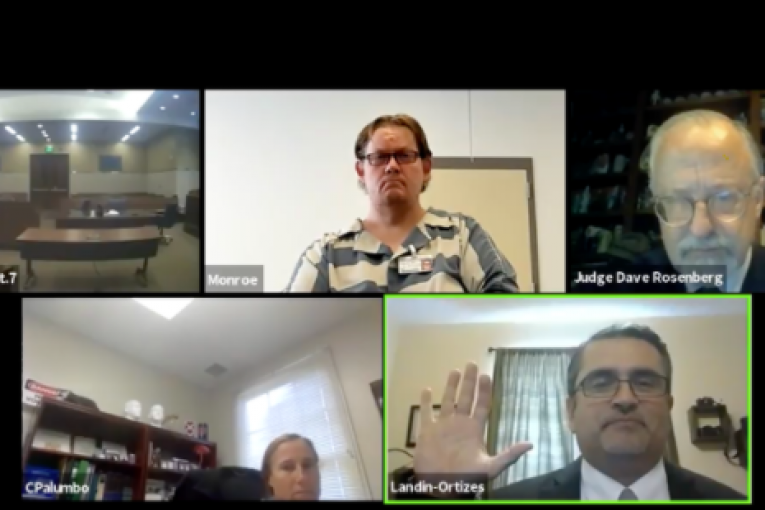

By Julietta Bisharyan
DAVIS, CA – In Yolo County Superior Court, a man was sentenced to four years after admitting to his therapist and parole officer that he downloaded over 600 explicit photos and videos of minors
The defendant, Franklin James Roberts, was found guilty of felony possession of obscene materials of individuals under 18 years old. During a mental health relapse, he admitted his crime to his therapist and parole office, which led to his arrest.
Deputy District Attorney Carolyn Palumbo called forth the first witness, Angel Ortiz, to testify, and he was sworn in through Zoom.
Ortiz is a therapist who works with the professional psychological corporation “Sharper Future,” which provides rehabilitation and therapy to parolees convicted of sex crimes. Roberts was assigned to Ortiz for therapy as a part of his parole, and the therapist worked with the defendant for five months before the arrest.
On Oct. 10, 2019, the defendant suffered from a mental health episode and checked into Woodland Memorial Hospital. Roberts self-reported to Ortiz that he had relapsed in his consumption of child pornography. This information was relayed to Roberts’ parole officer and led to his arrest.
Ortiz recalled that Roberts’s participation during the group therapy sessions was above average. Roberts had even requested additional counseling sessions and appeared to be making progress. When asked if the defendant would still be a good candidate for the program, Ortiz said yes.
“Is Mr. Roberts’ condition treatable? Is it a condition that will be with him his entire life or does one recover from it?” Judge David Rosenberg asked the witness.
Ortiz responded by saying that it is a case by case basis, and therefore it was difficult to answer due to his short time with the defendant.
The witness was then promptly dismissed.
“How often do you get to testify by Zoom?” asked the judge, jokingly. “Welcome to the new reality.”
Deputy Public Defender Lisa Lance argued that the court should give the defendant another chance, given that he has never been on probation before as an adult. She also noted that Roberts was doing well in therapy up until his relapse and should be given an opportunity to get better.
According to multiple mental health professionals, Roberts labors under severe depression and post-traumatic stress disorder, for which he takes medication. In addition, Roberts reportedly has a low level of sophistication, putting him in the bottom 35 percentile of intelligence. Lance argued that his voluntary acknowledgment of his wrongdoings should be taken into consideration, as it was his honesty that led to his arrest.
“If it wasn’t for Mr. Roberts, there wouldn’t even be a case,” Lance said.
Lance proposed that the court should grant him probation with a suspended middle base term of four years.
In response, Palumbo argued that the defendant possessed child pornography in different medias and under different usernames, making him computer savvy. This would invalidate Lance’s point of Roberts’ low level of intelligence.
In the defendant’s prior case in 2018, he was found with over 10,000 images of child pornography. Palumbo says that the court was generous in giving him a two-year sentence when she believes he should have received five years.
She also argued that Roberts did not acknowledge his crimes to the point of entering a no plea deal, as he caused things to be brought to trial.
Finally, Palumbo asked that the court sentence him for four years, concluding that his illegal downloading leads to the direct exploitation of minors.
After hearing from both sides, Judge Rosenberg sentenced Roberts to four years and denied his grant of probation.
“Mr. Roberts, good luck to you,” said the judge, as the defendant left the screen.
To sign up for our new newsletter – Everyday Injustice – https://tinyurl.com/yyultcf9

This case brings us so many heavy conundrums.
Being this is child pornography, among the most vile of crimes, there is little room for leniency.
But the whole mandatory reporting thing is so interesting. Someone has to be honest to be helped in therapy . . . but if they cross certain — admittedly extreme — lines, the therapist is obligated to report — so they can’t be honest.
And what a scary place that puts a therapist in if they do cross the line — because the person might realize what they have done, and then realize — well perhaps I’ve been watching too many psychopath dramas — that the only way out is to snuff the therapist. Or when they get out, they may seek revenge. One is pretty mentally ill if you are committing a mandatory reporting offense.
Also, to be convicted on Zoom? That’s pretty out there. Can one really, for instance, face their accusers — if the face is virtual? I wonder how many convictions are going to be overturned based on the trial being done on Zoom and later thrown out?
I’m pretty sure there have been no trials over Zoom and that this was a plea
Ah, thanks for the clarification. That makes sense.